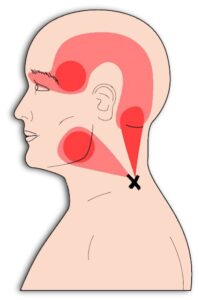Headaches and shoulder pain are two common complaints that many individuals experience at some point in their lives. While these symptoms might seem unrelated, there is a growing body of evidence suggesting a strong connection between them. In this blog, we will delve into the potential causes of headache and shoulder pain, and the intricate relationship.
Contents
Understanding Headache and Shoulder Pain

Headaches and shoulder pain are two common ailments that many individuals experience. While they might appear as separate issues, there is often a complex interplay between them. In this article, we will explore the various causes of both headaches and shoulder pain, as well as how they can be interconnected.
The Spectrum of Headaches
- Tension Headaches: These are the most prevalent type of headaches. They often stem from muscle tension in the neck and shoulders, which can radiate to the head, causing a dull, aching sensation. Prolonged stress, poor posture, and muscular imbalances can trigger tension headaches.
- Migraines: Migraines are characterized by intense, throbbing pain, usually on one side of the head. Although the exact cause is not fully understood, genetics, hormonal fluctuations, and certain triggers like specific foods, lack of sleep, or sensory stimuli can contribute to migraine development.
- Cervicogenic Headaches: These headaches originate from issues in the cervical spine (neck). Poor alignment, herniated discs, or nerve compression in the neck can lead to pain that radiates to the head, mimicking migraine symptoms.
Shoulder Pain Sources
- Muscle Strain: Overexertion, poor posture, or sudden movements can strain the muscles in the shoulders, resulting in discomfort and pain.
- Rotator Cuff Issues: The rotator cuff is a group of muscles and tendons that stabilize the shoulder joint. Inflammation, tears, or degeneration of these structures can lead to chronic shoulder pain.
- Frozen Shoulder: This condition involves the gradual stiffening of the shoulder joint, often resulting from inflammation. It can cause significant pain and restricted mobility.
- Referred Pain: Sometimes, pain originating in one area, such as the neck or upper back, can be referred to as the shoulder, creating a sense of discomfort in both regions.
The Connection
The relationship between headaches and shoulder pain is rooted in the complex network of nerves, muscles, and blood vessels that traverse these regions. Several factors contribute to their interconnectedness:
- Muscle Overlap: Muscles that connect the neck, shoulders, and head can transmit pain sensations between these areas. Tension or strain in one region can create a domino effect, leading to discomfort in the other areas.
- Nerve Pathways: Nerves extend from the neck and shoulders to the head, sharing pathways. Irritation or compression of these nerves can result in both headaches and shoulder pain.
- Shared Triggers: Stress, poor posture, and overuse of muscles are common triggers for both headaches and shoulder pain. Addressing these triggers can alleviate symptoms in both areas.
Lifestyle and Posture Impact

Some of the lifestyle and posture impacts on headache and shoulder pain:
- Stress and Tension: Our modern lifestyles are often marked by high stress levels. Stress triggers muscle tension, especially in the neck and shoulders, which can contribute to tension headaches and shoulder pain.
- Sedentary Habits: Prolonged hours spent sitting at desks or hunching over devices can lead to poor posture and weakened muscles. This not only affects the shoulders directly but also has a cascading effect on the neck and head, leading to discomfort.
- Dietary Choices: Certain foods, such as processed foods, caffeine, and alcohol, can act as triggers for migraines. Additionally, poor dietary habits can contribute to inflammation, which may exacerbate pain.
- Sleep Patterns: Irregular sleep schedules or inadequate sleep can heighten stress levels and lower pain tolerance, making headaches and shoulder pain more pronounced.
Managing Headache and Shoulder Pain
Some of the ways to manage headaches and shoulder pain:
- Mind-Body Techniques: Practices like mindfulness meditation, deep breathing, and progressive muscle relaxation can help alleviate stress and tension, reducing the frequency and intensity of both headaches and shoulder pain.
- Physical Activity: Engaging in regular exercise improves blood flow, reduces muscle tension, and boosts endorphin levels, offering natural pain relief.
- Hydration and Nutrition: Maintain a balanced diet and stay hydrated. Certain foods like ginger, turmeric, and magnesium-rich options may help alleviate pain.
- Sleep Quality: Prioritize healthy sleep patterns by maintaining a consistent sleep schedule, creating a comfortable sleep environment, and practicing relaxation techniques before bed.
- Stay Hydrated: Dehydration can trigger headaches. Aim to drink enough water throughout the day.
- Manage Stress: Incorporate stress management techniques, as stress is a common headache trigger. Yoga, meditation, and hobbies can help.
- Dietary Considerations: Identify potential food triggers for migraines, such as caffeine, processed foods, and artificial additives.
- Caffeine Control: While caffeine can relieve headaches, overconsumption or sudden withdrawal can trigger them. Maintain moderate caffeine intake.
- Stretch and Strengthen: Engage in gentle shoulder stretches and exercises to improve flexibility and strengthen supporting muscles.
- Heat and Cold Therapy: Applying heat or cold to the affected area can reduce inflammation and provide relief.
- Physical Therapy: Seek guidance from a physical therapist to develop a personalized exercise program for shoulder pain management.
- Ergonomic Awareness: Maintain proper posture while sitting, standing, and using electronic devices to alleviate strain on your shoulders.
Nutrition’s Role
Believe it or not, your diet can influence headaches and shoulder pain. Some foods might trigger discomfort, while others could offer relief.
Foods to Embrace
- Anti-Inflammatory Fats: Incorporate sources of healthy fats like avocados, nuts, seeds, and fatty fish (salmon, mackerel) rich in omega-3 fatty acids. These fats have been associated with reduced inflammation.
- Colorful Fruits and Vegetables: Berries, leafy greens, and brightly colored vegetables are packed with antioxidants and vitamins that combat inflammation and provide essential nutrients.
- Turmeric: This spice contains curcumin, a compound with potent anti-inflammatory properties. Add turmeric to your dishes or enjoy turmeric tea.
- Ginger: Known for its anti-nausea effects, ginger also has anti-inflammatory properties that might help alleviate headache and muscle pain.
Potential Triggers to Avoid
- Processed Foods: Highly processed foods often contain additives and unhealthy fats that can contribute to inflammation and trigger headaches.
- Caffeine: While caffeine in moderation can help alleviate headaches, excessive consumption or sudden withdrawal can trigger them.
- Artificial Sweeteners: Some individuals are sensitive to artificial sweeteners, which can lead to headaches in certain cases.
Medications and Natural Remedies
Some of the medications that can help and the natural remedies are:
- Over-the-Counter Pain Relievers: Non-prescription pain relievers like ibuprofen, aspirin, and acetaminophen can provide temporary relief from mild to moderate headaches and shoulder pain. They work by reducing inflammation and blocking pain signals.
- Triptans: Triptans are prescription medications specifically designed to treat migraines. They work by constricting blood vessels and blocking pain pathways in the brain.
- Muscle Relaxants: For shoulder pain caused by muscle tension, muscle relaxants may be prescribed to help alleviate discomfort by reducing muscle spasms.
- Prescription Pain Medications: In cases of severe pain, doctors might prescribe stronger pain medications. However, these are typically used cautiously due to the risk of dependence and side effects.
Natural Remedies
- Aromatherapy: Essential oils like lavender, peppermint, and eucalyptus can be used through inhalation or diluted for massage. Their soothing scents may help relieve tension and promote relaxation.
- Herbal Teas: Chamomile, peppermint, and ginger teas are known for their calming and anti-inflammatory properties. They can aid in relaxation and pain relief.
- Acupuncture: This traditional Chinese practice involves inserting thin needles into specific points on the body. Acupuncture may help alleviate both headache and shoulder pain by promoting energy flow and releasing tension.
Physical Therapy and Exercise

- Assessment and Diagnosis: A physical therapist will assess your shoulder pain, identifying the underlying causes. This may include evaluating your posture, range of motion, and muscle strength.
- Tailored Exercise Plans: Based on your assessment, a physical therapist will create a personalized exercise regimen. These exercises can help strengthen weak muscles, improve flexibility, and correct imbalances that contribute to shoulder pain.
- Manual Techniques: Physical therapists use hands-on techniques to mobilize joints, improve blood flow, and reduce muscle tension. These techniques can provide immediate relief and enhance the effectiveness of exercises.
- Posture Correction: Addressing poor posture habits is crucial for long-term shoulder pain relief. A physical therapist can teach you proper ergonomics and guide you in maintaining good posture during daily activities.
Exercise for Headache Relief
- Aerobic Exercise: Engaging in regular aerobic activities like walking, cycling, or swimming can help improve blood circulation, boost endorphins, and reduce the frequency of tension headaches.
- Yoga: Gentle yoga practices involve stretching, breathing exercises, and relaxation techniques that can alleviate muscle tension and stress, contributing to headache relief.
Alternative Therapies
Beyond conventional methods, alternative therapies like acupuncture, chiropractic care, and massage have gained popularity for their potential to alleviate pain.
Acupuncture
Originating from traditional Chinese medicine, acupuncture involves inserting thin needles into specific points on the body to balance the flow of energy or “qi.” This therapy has shown effectiveness in reducing the frequency and intensity of headaches and migraines. By stimulating nerve pathways, acupuncture can trigger the release of endorphins, which act as natural pain relievers. It’s important to consult a qualified acupuncturist for a safe and tailored experience.
Chiropractic Care
Chiropractic care focuses on aligning the spine to promote overall health and alleviate pain. For shoulder pain caused by misalignments or joint dysfunction, chiropractors use manual adjustments and manipulations to restore proper alignment. This can enhance nerve function, reduce muscle tension, and contribute to pain relief. Consult a licensed chiropractor who can assess your condition and provide appropriate treatments.
Massage Therapy
Massage therapy involves manipulating soft tissues to promote relaxation, improve circulation, and reduce muscle tension. For shoulder pain, targeted massage techniques can release knots, improve range of motion, and alleviate discomfort. Massage therapy can also help manage stress, which is often linked to headaches and shoulder pain. Consider seeking a licensed massage therapist experienced in treating pain-related issues.
Conclusion
In the intricate tapestry of headache and shoulder pain, understanding the underlying connections and triggers is paramount. By making mindful adjustments to your lifestyle, seeking professional guidance when needed, and exploring a range of strategies, you can pave the way for a life with less discomfort and more vitality.
If you’re experiencing Shoulder pain, physical therapy for shoulder pain at PhysioMantra can help: Book an online physical therapy session.



